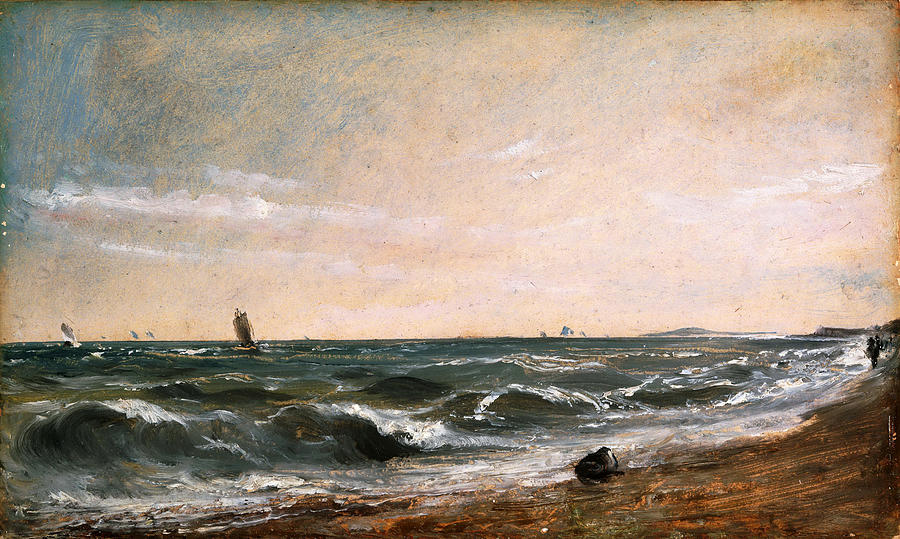‘Wave’ is the only possible English translation for two distinct German words: Woge and Welle. Although very nearly synonymous, they have different connotations and overtones. Most modern German speakers would say that ‘Woge’ feels slightly old-fashioned or literary. It is certainly the case that ‘Welle’ tends to be used in technical scientific contexts (e.g. electro-magnetic waves).
There is a verb ‘wogen’ (‘to cause a rocking motion’, as with a boat on a lake) but no verb corresponding with the noun ‘Welle’.
Readers might wish to use the two distinct indexes here to determine whether or not there was a distinction in the concept of ‘waves’ in the poems Schubert set to music.
☙
Descendant of:
WATERTexts with this theme:
- Des Mädchens Klage, D 6, D 191, D 389 (Friedrich von Schiller)
- Der Jüngling am Bache, D 30, D 192, D 638 (Friedrich von Schiller)
- Sehnsucht (Ach, aus dieses Tales Gründen), D 52, D 636 (Friedrich von Schiller)
- Der Taucher, D 77, D 111 (Friedrich von Schiller)
- Adelaide, D 95 (Friedrich von Matthisson)
- Am See (Sitz ich im Gras), D 124 (Johann Baptist Mayrhofer)
- Lied im Freien, D 133, D 572, D Anh. I, 19 (Johann Gaudenz von Salis-Seewis)
- Lodas Gespenst, D 150 (James Macpherson (Ossian) and Edmund von Harold)
- Nähe des Geliebten, D 162 (Johann Wolfgang von Goethe)
- Sängers Morgenlied, D 163, D 165 (Theodor Körner)
- Meeres Stille, D 215A, D 216 (Johann Wolfgang von Goethe)
- Das Finden, D 219 (Ludwig Theobul Kosegarten)
- Der Fischer, D 225 (Johann Wolfgang von Goethe)
- Tischlied, D 234 (Johann Wolfgang von Goethe)
- Das Abendrot, D 236 (Ludwig Theobul Kosegarten)
- Das Geheimnis (Sie konnte mir kein Wörtchen sagen), D 250, D 793 (Friedrich von Schiller)
- Das Mädchen von Inistore, D 281 (James Macpherson (Ossian) and Edmund von Harold)
- Cronnan, D 282 (James Macpherson (Ossian) and Edmund von Harold)
- Shilric und Vinvela, D 293 (James Macpherson (Ossian) and Edmund von Harold)
- Klage der Ceres, D 323 (Friedrich von Schiller)
- Laura am Klavier, D 388 (Friedrich von Schiller)
- Entzückung an Laura, D 390, D 577 (Friedrich von Schiller)
- Der Herbstabend, D 405 (Johann Gaudenz von Salis-Seewis)
- Gesang der Geister über den Wassern, D 484, D 538, D 705, D 714 (Johann Wolfgang von Goethe)
- Zum Punsche, D 492 (Johann Baptist Mayrhofer)
- Leiden der Trennung, D 509 (Pietro Metastasio and Heinrich Joseph von Collin)
- Der Schiffer, D 536 (Johann Baptist Mayrhofer)
- Auf dem See, D 543 (Johann Wolfgang von Goethe)
- Auf der Donau, D 553 (Johann Baptist Mayrhofer)
- Iphigenia, D 573 (Johann Baptist Mayrhofer)
- Atys, D 585 (Johann Baptist Mayrhofer)
- Einsamkeit, D 620 (Johann Baptist Mayrhofer)
- Widerschein, D 639, D 949 (Franz von Schlechta)
- Die Gebüsche, D 646 (Karl Wilhelm Friedrich Schlegel)
- Hymne I, D 659 (Friedrich Leopold von Hardenberg (Novalis))
- Beim Winde, D 669 (Johann Baptist Mayrhofer)
- Morgenlied (Eh die Sonne früh aufersteht), D 685 (Friedrich Ludwig Zacharias Werner)
- Der entsühnte Orest, D 699 (Johann Baptist Mayrhofer)
- Der zürnenden Diana, D 707 (Johann Baptist Mayrhofer)
- Im Walde (Waldesnacht), D 708 (Karl Wilhelm Friedrich Schlegel)
- Grenzen der Menschheit, D 716 (Johann Wolfgang von Goethe)
- Drang in die Ferne, D 770 (Carl Gottfried von Leitner)
- Auf dem Wasser zu singen, D 774 (Friedrich Leopold Graf zu Stolberg-Stolberg)
- Vergissmeinnicht, D 792 (Franz Adolph Friedrich von Schober)
- Der Pilgrim, D 794 (Friedrich von Schiller)
- Gesang der Norna, D 831 (Walter Scott and Samuel Heinrich Spiker)
- Im Walde (Ich wandre über Berg und Tal), D 834 (Ernst Konrad Friedrich Schulze)
- Wiedersehn, D 855 (August Wilhelm Schlegel)
- Fischerweise, D 881 (Franz von Schlechta)
- Lebensmut, D 883 (Ernst Konrad Friedrich Schulze)
- An die Laute, D 905 (Friedrich Rochlitz)
- Schiffers Scheidelied, D 910 (Franz Adolph Friedrich von Schober)
- Das Weinen, D 926 (Carl Gottfried von Leitner)
- Der Kreuzzug, D 932 (Carl Gottfried von Leitner)
- Des Fischers Liebesglück, D 933 (Carl Gottfried von Leitner)
- Auf dem Strom, D 943 (Ludwig Rellstab)
- Frühlingssehnsucht, D 957/3 (Ludwig Rellstab)
- Aufenthalt, D 957/5 (Ludwig Rellstab)
- In der Ferne, D 957/6 (Ludwig Rellstab)
- Die Bürgschaft, D 246 (Friedrich von Schiller)


